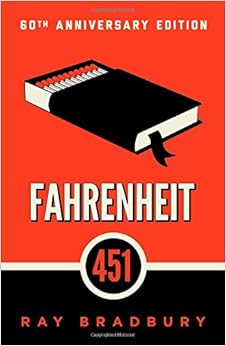
1984. Brave New World. These two literary works have re-defined the term "dystopia" at the turn of the 20th Century. However, another book, just as known and reputable, Fahrenheit 451, authored by one of the most creative writers America let alone the world has ever seen, has breathed life into this otherwise dank and dreary conception. The book is titled after "the temperature at which book paper catches fire and burns." Unlike its older counterparts, it is shorter in length (about 160 pages) and is set in a world where intellectual thought is actively (and violently) suppressed and entertainment in all its forms is encouraged. The story follows Guy Montag, a "fireman" (I'll leave the word at that) who lives in this dark and gloomy future. Without spoiling too much, he gets caught in a series of events that unravel the flaws of his era.
Having read 1984 and excerpts of Brave New World, I am pleased to say that Bradbury's work, despite its relative brevity, surpasses its predecessors in its simple yet engrossing linguistic style (much to be said about mine in this post, yes?), ability to absorb you in its unrealistically real atmosphere, and character development. Themes such as intellectual progress, discourse as a form of power, and nihilism play prominent roles in this novel. What makes this book a must-read, however, is its frighteningly prophetic foretelling (at its time, at least) of our current global political climate, the dangers of globalization, the threat of mass culture, and - no, I think I'm going to stop spoiling it right there, because if you've wasted our time reading this review right now, then stop reading and get... this... book!
Content - 5/5
Style - 5/5
Overall - 5/5

Comments
Post a Comment